Overview of Antibody Drug Conjugate (ADC) biopharmaceutical manufacturing services offered by leading contract manufacturing organizations (CMOs).
Q1. What are Antibody Drug Conjugates (ADCs)?
Antibody-drug conjugates (ADCs) are highly targeted biopharmaceutical drugs that combine monoclonal antibodies (mAbs) specific to surface antigens present on particular tumor cells. Biopharmaceutical ADCs are composed of three components: the antibody, the linker, and the cytotoxic agent.
Antibody-Drug Conjugates (ADCs) are built by attaching a small molecule cytotoxic drug or another therapeutic agent to an antibody, with either a permanent or a labile linker. Selection of an appropriate target, a monoclonal antibody (mAb), cytotoxic payload, and the manner in which the antibody is linked to the payload are key determinants of the safety and efficacy of ADCs.
When the monoclonal antibody (mAb) finds the protein on the outside of the cancer cell, the cell pulls the drug inside. Once inside the cell, the linker releases the toxic cancer drug directly inside the cancer cell. By targeting the cancer cells in this way, exposure of healthy cells to the cytotoxic drug is decreased.
Early ADCs encountered major obstacles including, low blood residency time, low penetration capacity to tumor microenvironment, low payload potency, immunogenicity, unusual off-target toxicity, drug resistance, and the lack of stable linkage in blood circulation.
However, advances in synthetic biochemistry have ushered in a new generation of ADCs, which promise to improve upon the tissue specificity and cytotoxicity of their predecessors. Ongoing efforts are focused on identifying better targets, more effective cytotoxic payloads, and further improvements in antibody-drug linker technology.
Using ADCs in combination with other drug or therapy classes is one of the emerging concepts and multiple organizations are evaluating their ADC candidates in combination with immune checkpoint inhibitors, epigenetic modulators, monoclonal antibodies (mAbs), etc.
A few different antibody drug conjugates (ADCs) are currently approved as cancer treatments, with dozens more in preclinical and clinical development. Several promising antibody-drug conjugates (ADCs) are now in late-phase clinical development and testing stages.
With approximately 70 percent of ADC projects outsourced to contract development and manufacturing organizations (CMDOs) and contract manufacturers (CMOs), a transparent and integrated supply chain is critical to success.
CDMOs and CMOs that offer contract manufacturing for antibody drug conjugates and highly potent active pharmaceutical ingredients (HPAPIs) are setting up processes to handle challenging supply chains and investing in facilities and processes to ensure efficiency, quality, transparency, and security for their customers.
Q2. What are the steps involved in the development and manufacturing of Antibody-Drug Conjugates?
In the drug development of new cancer therapies, molecules have become more potent, and their structures, physical properties and final dosage forms have simultaneously become more complex. Therefore, ADC production requires both biological and chemical know-how.
As noted above, an Antibody Drug Conjugate (ADC) is composed of three components: the antibody, the linker, and the cytotoxic agent. These components of Antibody Drug Conjugates (ADCs) are further defined below.
Antibody
One of the most critical factors in the production of ADCs is the choice of antibody. Monoclonal antibody (mAb) drugs are cancer treatments that enlist natural immune system functions to fight cancer. One of the most important benefits of using mAbs rather than small-molecule chemotherapeutic agents is that they can have favourable pharmacokinetics with respect to duration, metabolism and elimination.
Cytotoxic Agent
Today, two main categories of highly potent cytotoxic agents are used in antibody-drug conjugates: microtubule disrupting agents and DNA modifying agents. Such cytotoxic drugs have cancer-killing capabilities.
Linker
An appropriate linker between the antibody and the cytotoxic agent provides a specific bridge, and thus helps the antibody to selectively deliver the cytotoxic drug to tumor cells (ie. release them at tumor sites). In addition to conjugation, the linkers maintain the ADC’s stability during the preparation and storage stages and during the ADC’s systemic circulation period.
Despite this diversity in the design of ADC molecules, many ADC manufacturing processes, including the clinical and commercial manufacturing of antibody-drug conjugates (ADCs), consist of three distinct stages: the functionalization of the antibody, the conjugation reaction, and the downstream purification and formulation steps.
- Functionalization of The Antibody
ADC production begins with a modification of antibodies to make them amenable for payload conjugation. Hence, controlling this step is important for the overall quality of ADCs. The most common modification is to partially reduce the disulfide bonds present in the antibodies.
- The Conjugation Reaction
To carry out a conjugation reaction, two chemical processes are usually required. First, the antibody is treated to create sites ripe for conjugation which can then be reacted with a suitable group on a linker attached to the cytotoxic payload to create an ADC.
- Downstream Purification and Formulation
The conjugation reaction is followed by protein purification techniques to remove process-related contaminants (unconjugated toxin and residual solvent). The purification process in the production of ADCs is complex due to the heterogeneity of the bioconjugates. The main challenges are in the isolation of the unconjugated antibody and free drug, and the separation in different Drug-Antibody-Ratio (DAR), which correlates with the potency of the ADC.
Q3. What are the challenges involved in the manufacturing of ADCs?
The challenges inherent with contract manufacturing for antibody drug conjugates and highly potent active pharmaceutical ingredients (HPAPIs) are attributable to the additional process, safety and analytical requirements conferred by bioconjugation of the biologic to the highly active cytotoxic component.
Manufacturing of ADCs (Antibody Drug Conjugates), highly potent biopharmaceuticals, thus present a series of unique challenges. Some of the challenges involved in the manufacturing of ADCs are explored in detail below.
GMP Custom Manufacturing
Perhaps the greatest challenge in ADC manufacturing is the design and construction of a biological custom manufacturing environment that allows the safe manipulation of highly cytotoxic drugs.
As an ADC must undergo custom manufacturing in a Current Good Manufacturing Process (cGMP) aseptic environment whilst also ensuring containment of the highly cytotoxic drug compounds to protect operators and the wider environment, it presents significant operational difficulties.
Bioconjugation Tech Transfer
ADC contract manufacturers (CMOs) offering contract manufacturing services, including the clinical and commercial manufacturing of antibody-drug conjugates (ADCs), are subject to challenges arising from the handling of highly potent molecules that require high containment, as well as carrying out the bioconjugation steps which typically use a mixture of aqueous/organic solvents.
Furthermore, ADC contract manufacturers (CMOs) are faced with the typical challenges associated with the biologic itself, such as maintaining the activity and physical state of the molecule, keeping endotoxin levels low, and maintaining sterility/low bioburden.
Excessive Hydrophobicity
The overall hydrophobicity of an ADC is now considered to be a key physicochemical parameter, directly influencing ADC pharmacokinetics, efficacy and tolerability (therapeutic index). Cytotoxic payloads attached to the antibody inherently confer increased hydrophobic character and aggregation potential to the final conjugate.
Aggregation
Aggregation may take place during ADC manufacturing. Aggregation of biomolecules can occur for a variety of reasons. Some antibodies are inherently prone to aggregation, especially when they are maintained in solution under conditions that promote aggregation.
Target Selection
Target selection is perhaps one of the most critical issues in ADC drug development and contract manufacturing for antibody drug conjugates, as characteristics of an ideal target include high, homogenous, and exclusive expression on tumor cells, little to no antigen shedding, internalization capability, and high expression within the tumor but little to no expression in healthy cells.
Costly Infrastructure
With the advent of increasingly potent cytotoxins used in the drug development of ADCs, facility designs and containment systems have required significant redesign to be able to cope with scale, demand, and operator safety.
Q4. Which are the leading contract manufacturers offering Antibody Drug Conjugates (ADCs)?
Presently, ADCs are considered a part of mainstream health care regimens, having generated significant enthusiasm within the medical science community across the world.
Outsourcing of development (eg. clinical development) and contract manufacturing services for ADCs (ADC clinical and commercial manufacturing) is common, owing to the complexity of these multicomponent drug substances.
Some leading contract manufacturers offering contract manufacturing for Antibody Drug Conjugates (ADCs) are noted below.
AbbVie Contract Manufacturing
AbbVie specializes in the clinical and commercial manufacturing of antibody-drug conjugates (ADCs) and monoclonal antibodies (mAbs). Their state-of-the-art facility has the capability to optimize success from innovation through commercialization.
AbbVie’s strength in discovering and developing highly specific monoclonal antibodies (mAbs), all the way up to commercialization, and its experience in small molecule chemistry and analytics make ADCs a strong focus area of development for AbbVie.
Minakem
Minakem offers contract manufacturing services for ADC production. Their labs are designed with state-of-the-art high containment technologies to specifically support antibody-drug conjugate development and the contract manufacturing of antibody-drug conjugates along with highly potent active pharmaceutical ingredients (HPAPIs.
The laboratory is equipped with vessels up to 10L which enables Minakem to manufacture from mg to 100s of grams of ADC payloads and highly potent active pharmaceutical ingredients (HPAPIs) under GMP & non-GMP conditions, to support clinical trials.
Recipharm AB
Recipharm's CDMO provides synthetic services related to contract manufacturing for Antibody Drug Conjugates (ADCs) including the preparation and purification of ADCs and other bioconjugates and the modification of carbohydrates (polysaccharides and glycoconjugates).
Recipharm’s scientists have extensive experience in providing services related to the synthesis and characterisation of antibody-drug conjugates (ADCs) and other bioconjugates.
Sai Life Sciences Limited
Sai Life Sciences has experience across a wide range of chemistries - asymmetric synthesis, production of ADCs (ADC clinical and commercial manufacturing), chiral pool synthesis, heterocycles, isotope labelled (13C and 2D) synthesis, nucleosides and nucleotides, peptides, steroids, etc.
IDT Biologika GmbH
IDT Biologika GmbH offers a one-source solution for ADC production or the contract manufacturing of antibody-drug conjugates, from DNA to clinical trials all the way up to commercialization - ADC clinical and commercial manufacturing.
All Suppliers






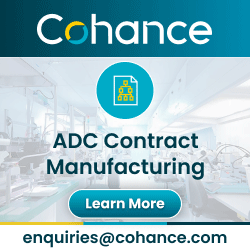
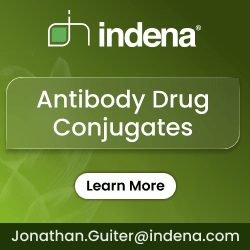
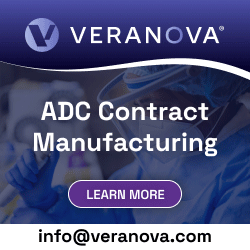
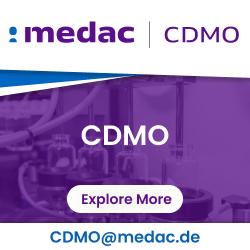
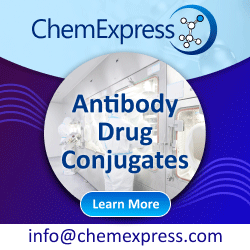
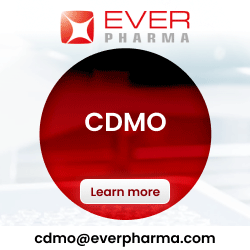




 Cohance Lifesciences, offers full range of CDMO services for small molecule APIs, intermediates, ADCs, Pellets and Formulations.
Cohance Lifesciences, offers full range of CDMO services for small molecule APIs, intermediates, ADCs, Pellets and Formulations.














